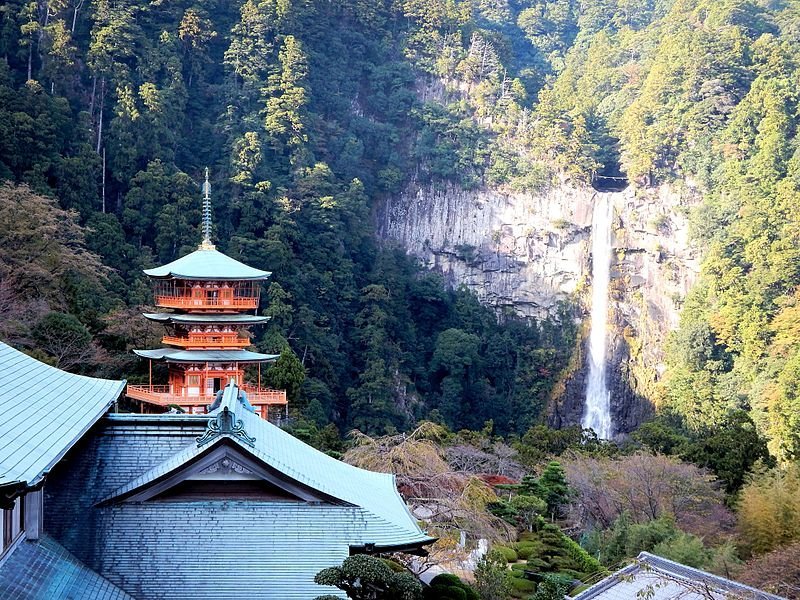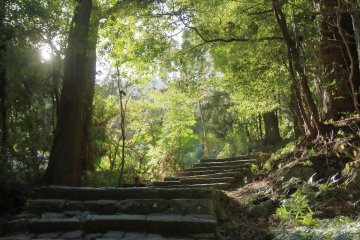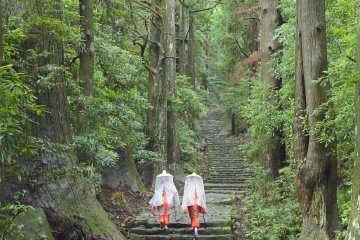
Nachi Taisha - Kumano Kodo
Katherine MooreNachi Taisha with its waterfall and pagoda is one of the 3 sacred shrines of Kumano in the Kii Mountains - and probably the most attractive!

The Kumano Nachi Taisha is a Shinto shrine and part of the UNESCO World Heritage-listed holy sites and pilgrimage routes in the Kii Mountains of Japan. The Kumano Kodo Route connects it with other sites of the same classification, mainly in Wakayama Prefecture This is the perfect area for hiking enthusiasts.
The shrine is part of a large complex of neighboring religious sites that illustrate the amalgamation of Buddhist and Shinto influences that is characteristic of the Kumano region. The site also has the highest waterfall in Japan. The 133 meter high Nachi no Taki still impresses many travelers with its strength and natural beauty.

Nachi Taisha with its waterfall and pagoda is one of the 3 sacred shrines of Kumano in the Kii Mountains - and probably the most attractive!

The Nachi Fire Festival, or Nachi-no-Ogi Matsuri, is a vibrant and historic event held annually on July 14th at the Kumano Nachi Taisha Grand Shrine in Wakayama Prefecture, Japan.

Illustrious chefs, Shinto, Buddhist, and Shugendo spiritual leaders, virtuoso musicians, tea ceremony masters, and a renowned calligrapher collaborate at a Japanese World Cultural Heritage site to produce an exclusive program of events blending the culinary, artistic, and spiritual worlds. This is Nachi Premier.

Nachi Waterfall (那智滝, Nachi no Taki) in Nachikatsuura, Wakayama Prefecture, is one of the most famous waterfalls in Japan. With a drop of 133 meters, it is the highest...

Wakayama Prefecture, located in Japan’s southern Kansai region, is a spiritually attuned and naturally beautiful destination famous for its religious pilgrimages, cultural sites, and temple stays, as well as its alluring forests, mountains, and beaches.

Temple Camp or Temple Hotel, staying at Daitai-ji temple in Kumano, Wakayama, you can enjoy sauna and Zen near the famous Nachi Falls and the Kumano Kodo pilgrimage trails.

You can have outdoor adventures at Daitai-ji temple in Kumano, near the Nachi Falls. Combine camping at the temple with Zen meditation.

For over 1,000 years, Japanese people from all walks of life, including retired emperors and aristocrats, have made the arduous pilgrimage of Wakayama. The Kumano Kodo is a network of ancient pilgrimage routes that traverse the Kii Peninsula in southern Wakayama Prefecture. These sacred paths have become Created to serve as pilgrimage routes to enter the sacred Kumano Sanzan area, which includes the three great shrines of Kumano Hongū Taisha, Kumano Nachi Taisha and Kumano Hayatama Taisha. In July 2004, the Kumano Kodo Pilgrimage Routes were established as part of the "Sacred Sites and Pilgrimage Routes in the Kii Mountain Range" added to the list of UNESCO World Heritage Sites. There are 4 main routes in total: The Nakahechi Route is the most popular route. From the 10th century onwards, the Nakahechi route was used extensively by the imperial family on pilgrimages from Kyoto. The Kohechi route connects the Buddhist temple complex of Koyasan and Kumano-Sanzan. Hikers should be well prepared if they want to take this route. The Ohechi Route offers picturesque views over the Pacific, while the Iseji Route features a variety of mountain passes, bamboo forests, terraced rice fields and beaches.

The stunning backdrop of Nachi Waterfalls has become an iconic photo of Japan. Why not come and discover the area for yourself? Nachi-san has so much to offer, giving you the real Japan.

In addition to cherry blossoms, Nachikatsuura also offers a wealth of historic heritage, as well as rejuvenating hot springs and some of the country’s freshest tuna.